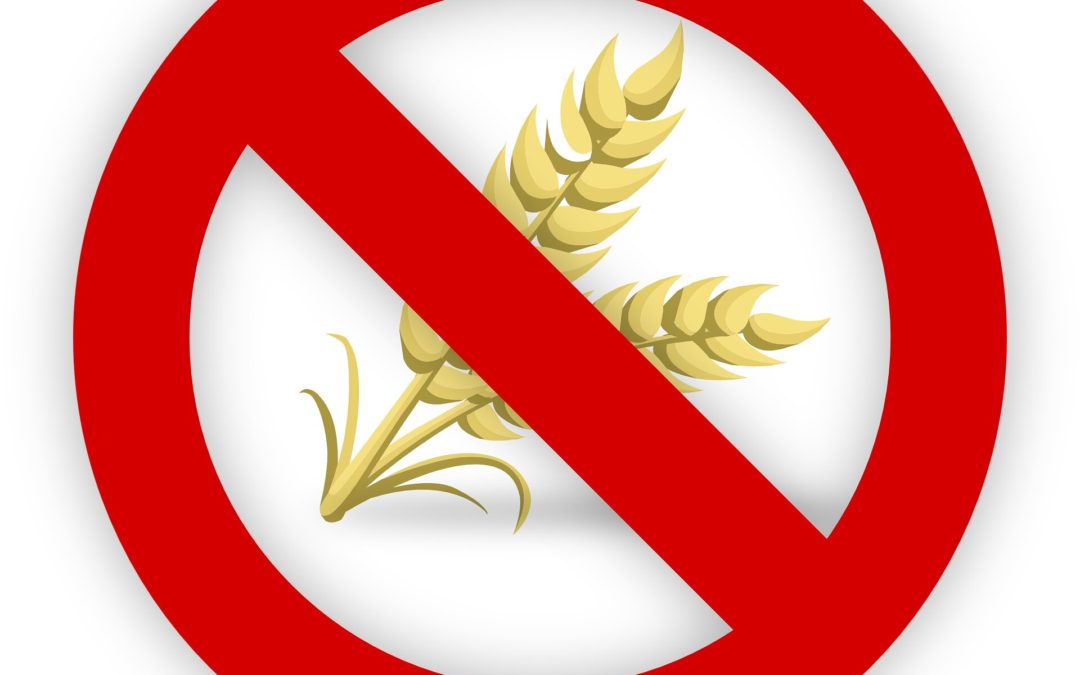In this day and age we hear a lot about gluten. I have heard many people that make jokes about people who eat gluten-free, like they are just trying to be special. However 1 in 100 people, around the world has Celiac Disease, many of which do not know they have it, or that long-term health complications may be in their future. There are some people who’s bodies are unable to digest or break down gluten. This is called gluten intolerance and the level of sensitivity varies between people. But there is a difference between gluten intolerance and people who have Celiac Disease.
Celiac Disease is a chronic autoimmune disorder that affects the digestion system where a person’s immune system causes their body to attack their small intestine when they ingest gluten. When this happens their immune system create toxins that destroy the villi in the small intestine. Villi are tiny finger-like systems that absorb nutrients from food. When a person’s villi are destroyed they can literally starve to death and sometimes other damage in their other body parts occur. Celiac Disease is also known as Sprue, Nontropical Sprue and Gluten-Sensitive Enteropathy.

Gluten is a protein found in many foods and personal products like medicines, vitamins and cosmetics.
Gluten is Mainly Found in the Following Grains:
- Wheat (Spelt, Durum, Bulgur, Farina, Semolina)
- Barley
- Rye
- Triticale (a man-made hybrid grain made by crossbreeding wheat and rye)
- Graham Flour
- Oatmeal that has been processed on machinery that processes the grains listed above
It is estimated that nearly 2,500,000 Americans have Celiac Disease and they don’t even know it. Celiac Disease is nothing to laugh about. People who have Celiac Disease must completely remove gluten from their diet and this is not so easy to do, since gluten is used so many ways and not just in bread, pasta, baked goods and beer, but gluten is often used as a stabilizing agent in many processed foods and personal products.
Celiac Disease affects children and adults differently. Symptoms and severity of symptoms differ between people depending on how long the person was breast-fed as an infant, the age they started eating gluten, the amount of gluten someone eats and the severity of intestinal damage they have because of this disease. There are some people who will never have regular symptoms, however they may develop long term complications as a result of their disease.
Celiac Disease Symptoms in Children
- Regularly tired and irritable
- Smaller in size that other children their age
- Delayed puberty
- Weight loss
- Vomiting
- Abdominal bloating and pain
- Persistent diarrhea or constipation
- Pale, fatty, foul-smelling stools
- Attention Deficit Hyperactivity Disorder
- Learning disabilities
- Headaches
- Lack of muscle coordination
- Seizures
Celiac Disease Symptoms in Adults
- Digestive issues
- Iron-deficiency anemia
- Joint pain and stiffness
- Weak, brittle bones
- Fatigue
- Seizures
- Skin disorders, including Dermatitis Herpetiformis
- Numbness and tingling in the hands and feet
- Problems with balance or cognitive impairments
- Headaches
- Tooth discoloration or loss of enamel
- Pale sores inside the mouth
- Irregular menstrual periods
- Infertility and miscarriage
- Reduced functioning of the spleen
Celiac Disease runs in families. If your parent or a sibling has Celiac Disease, there is a 1 in 10 chance that you will develop Celiac Disease. People who have other autoimmune diseases or genetic disorders also have a greater chance of having Celiac Disease.
What Should You Do If You Think You Have Celiac Disease?
If you have had diarrhea or digestive discomfort that lasts longer than two weeks or if your child is pale, irritable, failing to grow, has a potbelly or foul-smelling, bulky stools, it is very important that you make an appointment to see your primary medical professional. At your appointment you should share all your symptoms, honestly. Your doctor will do a physical exam, ask questions and probably refer you for blood tests since people who have Celiac Disease and are currently eating gluten will have high levels of antiendomysium (EMA) and anti-tissue transglutaminase (tTGA) antibodies in their blood that these tests will measure. Your doctor also may order a skin biopsy or an upper endoscopy.
Don’t just put yourself on a gluten-free diet before you discuss this with your doctor because it can change the necessary test results used to diagnose your condition. Even if you don’t have any symptoms, if you have a family member who is diagnosed with Celiac Disease or type 1 diabetes, it is a good idea to mention it to your doctor during your regular check ups.
Click here to go to celiac.org to see their Symptoms Assessment Tool
What is the Treatment for Celiac Disease?
There is no medicine to take to relieve Celiac Disease. Celiac Disease is treated only by removing gluten from your diet. Your doctor will talk with you about how to avoid foods with gluten in them or that are commonly processed on machines that process products with gluten in them. Even traces of gluten can make you feel sick and affect your body. Luckily many products in the store are labeled Gluten-Free. If a product is not labeled this way, there may be traces of gluten in that product.
Foods You Should Avoid if Not Labeled Gluten-Free:
- Beer
- Bread
- Cakes and pies
- Candy
- Cereals
- Cookies
- Crackers
- Croutons
- Gravy
- Imitation meat or seafood
- Oats
- Pasta
- Processed lunch meats, sausages and hot dogs
- Salad dressing
- Sauces (including soy sauce)
- Self-basting poultry
- Soups
Gluten-Free Grains and Starches That Are Safe for People with Celiac Disease:
- Buckwheat
- Corn
- Amaranth
- Arrowroot
- Cornmeal
- Flour made of rice, soy, corn, potatoes or beans
- Pure corn tortillas
- Quinoa
- Rice
- Tapioca
There are still lots of healthy foods you can eat that do not have gluten in them, so don’t be too overwhelmed.
Some Naturally Gluten-Free Foods Are:
- Fresh meats, fish, and poultry that has not been breaded, coated or marinated
- Fruit
- Most dairy products
- Starchy vegetables like peas, potatoes, sweet potatoes, corn
- Rice, beans and lentils
- Vegetables
- Wine, distilled liquors, ciders, and spirits
By eating a diet free of all gluten, people with Celiac Disease should begin to feel better within 6 weeks. Their body will heal from the damage gluten does to their body, which lets their body absorb nutrients in foods without dire side-effects so they can lead a normal, active life without pain but they still need to make sure to see their doctor for regular check ups because people with Celiac Disease have a greater chance of developing coronary artery disease and small bowel cancers.
On the up-side early diagnosis of Celiac Disease lowers chances of developing other medical conditions.
People who have Celiac Disease, who do not maintain a gluten-free diet have a greater chance at other terrible autoimmune diseases and medical conditions.
Some Conditions Related to Celiac Disease Are:
- Lupus
- Rheumatoid Arthritis
- Type 1 Diabetes
- Thyroid Disease
- Autoimmune Liver Disease
- Addison’s Disease
- Sjogren’s Syndrome
- Down Syndrome
- Turner Syndrome
- Lactose Intolerance
- Intestinal Cancer
- Intestinal Lymphoma
If someone in your family has Celiac Disease, please make an appointment to see your primary medical professional. Simple blood tests can find if you have this disease, and if you have Celiac Disease, you can begin making the necessary lifestyle changes for greater energy and longevity. If you know someone who has the symptoms mentioned and they have not been evaluated by their medical team, please let them know how much you love them and would like to be tested.
At Wellness Works NW we want you to be the best, you, you can be. If you are needing someone to cheer you on, help you create a comprehensive wellness plan or just want prayer, please Contact Us today and someone from Our Team will be ready to help you.
I hope this article answered questions you had and was easy to understand. If you would like us to write about a particular topic that you can’t find on this site, please send us an email on our Dear Jamie page and someone from Our Team will be glad to research and write about your topic.
Resources and Start Learning More:
- Celiac disease by Mayo Clinic Staff
- Celiac Disease: More Than Gluten Intolerance by Vernada Lights and Elizabeth Boskey, PhD and medically reviewed by Elaine K Luo, MD for Health Line
- Triticale is Gaining Popularity with Dairy and Beef Cattle Producers by Ann Blount, Cheryl Mackowiak, Nick DiLorenzo and Jose Dubeux of University of Florida Extension for Drovers Newsletter
- What is Celiac Disease? by Celiac Disease Foundation Staff
Related Articles
- What is Gluten Anyway?
- Oh no! Glutened! Now what?
- Celiac Living
- Living with Celiacs During the Holidays
- Celiac Friendly Baked Goodies That Taste Real – Never Fail Pie Crust
I hope this article helps Fuel Your Wellness. Please leave your comments below.
 Summer D Clemenson co-owns Clemenson Enterprises and Wellness Works NW with her wife, Karen G Clemenson. Their personal motto is Creativity, Honesty & Positivity are a must! This mantra helps them stay community and wellness minded in all they do. Summer is an Independent Wellness Advocate at dōTERRA. Summer also writes poetry and inspirational blogs @ ClemensonEnterprises.com. Her crochet art can be viewed and purchased @ KnottyWares.com & she loves special orders!
Summer D Clemenson co-owns Clemenson Enterprises and Wellness Works NW with her wife, Karen G Clemenson. Their personal motto is Creativity, Honesty & Positivity are a must! This mantra helps them stay community and wellness minded in all they do. Summer is an Independent Wellness Advocate at dōTERRA. Summer also writes poetry and inspirational blogs @ ClemensonEnterprises.com. Her crochet art can be viewed and purchased @ KnottyWares.com & she loves special orders!













